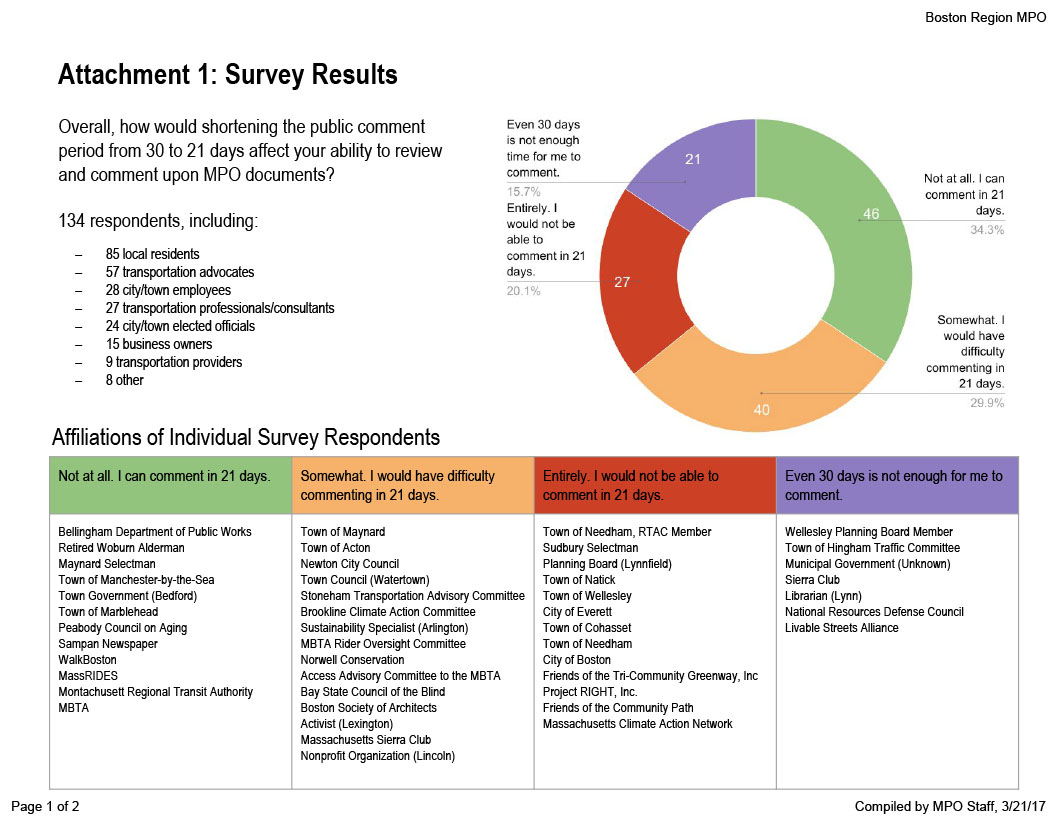
Memorandum
DATE: March 30, 2017
TO: Boston Region Metropolitan Planning Organization
FROM: Karl H. Quackenbush, MPO Executive Director,
and Jennifer M. Rowe, Public Participation Program Manager
RE: Amendment to Public Participation Plan
The Massachusetts Department of Transportation (MassDOT) has requested that all metropolitan planning organizations (MPOs) in the state amend their public participation plans to shorten the length of the public review and comment period for both draft certification documents and amendments to final certification documents. The following sections provide the language of the proposed amendment, the public review process, and background information for your consideration.
The Boston Region Metropolitan Planning Organization (MPO) votes to amend its Public Participation Program, to shorten the public review and comment period for both draft certification documents and amendments to final certification documents.
The proposed amendment would modify five sentences, in three sections of the Public Participation Program (approved October 2014). The proposed changes are shown in red text below:
The MPO discusses the staff recommendations and comments on both the TIP and the UPWP and releases draft documents for a 30 21-day public review and comment period.
Although the public participation schedule is different for the LRTP, it follows the same general sequence and set of outreach tools used for the TIP and UPWP, and if possible public participation activities for the LRTP are coordinated with TIP and UPWP outreach. The MPO releases the draft LRTP for a public review and comment period that is, at minimum, 21 days long.
The proposed draft amendment then is posted on the MPO’s website and a 30 21-day public comment period begins.
At its meeting on January 19, the MPO voted to release the proposed Amendment for a 45-day public review and comment period.
MPO staff notified the public of the review and comment period through email, Twitter, and a notice banner on the MPO’s website homepage. Staff also made announcements at the February meetings of the Regional Transportation Advisory Council and the Access Advisory Committee to the MBTA.
Staff invited the public to take a short survey, submit a written or oral comment, and/or give testimony during regularly-scheduled MPO meetings. A total of 134 individuals took the survey. Additionally, 23 individuals or organizations submitted comments. Please refer to Attachments 1 and 2 for the survey results and a compilation of the comments received, including that of the MPO’s Regional Transportation Advisory Council.
A 21-day public review and comment period will allow for the Boston Region MPO to shorten the annual Transportation Improvement Program (TIP) development process. This should enable the MPO to annually endorse a final TIP by the end of May.
MassDOT compiles the regional TIPs prepared by the state’s thirteen MPOs into the State Transportation Improvement Program (STIP). Because MassDOT includes the STIP in its Capital Investment Plan (CIP), early approval of each region’s TIP would allow MassDOT to develop the two state documents in sync and finalize both by the end of each state fiscal year.
This year, MassDOT’s Capital Programs Committee is scheduled to meet on June 8, and the MassDOT Board of Directors and the MBTA’s Fiscal and Management Control Board are scheduled to meet on June 12 to vote on the CIP. Please refer to Attachment 3 for a timeline reflecting accelerated approvals of the MPO’s TIP and MassDOT’s STIP and CIP.
To inform your consideration of this proposed amendment, staff has attached relevant excerpts from the Federal Metropolitan Planning Rule (Attachment 4), as well as the Boston Region MPO’s Public Participation Plan (Attachment 5).
KHQ/JMR/jmr

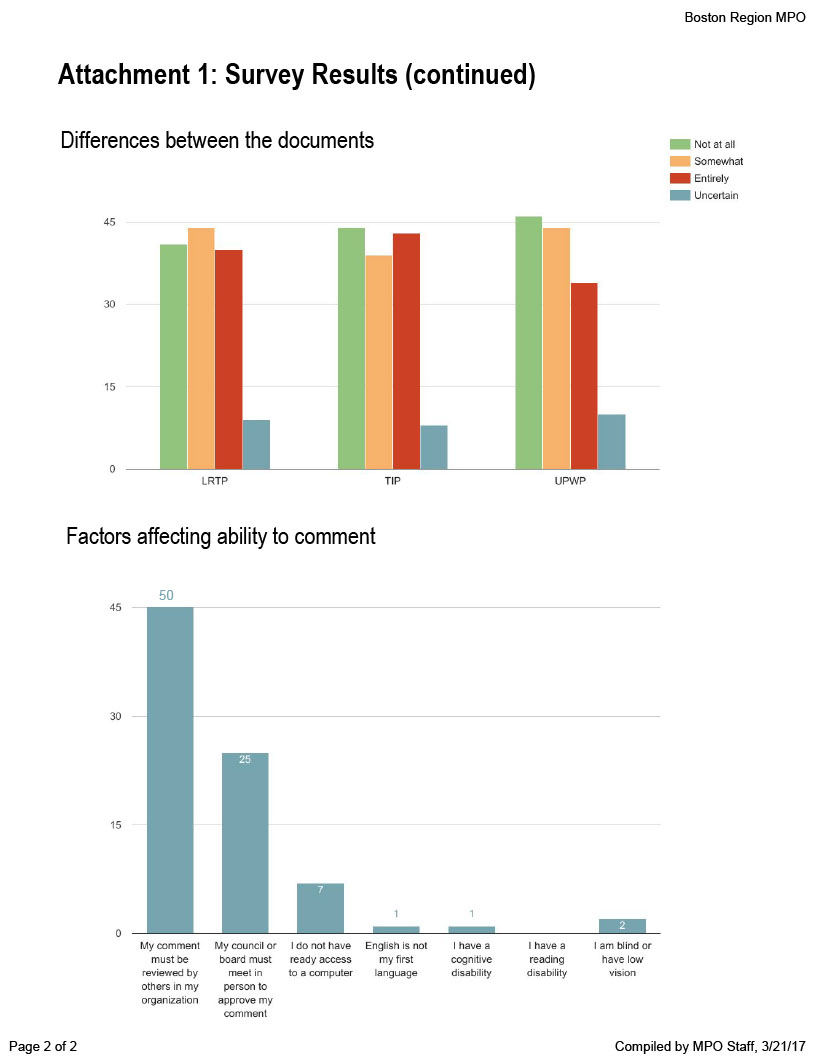
| Tegin Teich Bennett, Regional Transportation Advisory Council |
Do not shorten the periods permanently without further assessment of the impacts. Consider shortening only the TIP, or only the TIP and UPWP, only this year. Evaluate the impact and potential mitigation strategies. Consider and evaluate other options for aligning schedules. |
[See attached letter for full comments. Excerpt provided below.] As the chair of the Regional Transportation Advisory Council (Advisory Council), I am writing to express concerns that the Advisory Council membership has with the proposal to amend the Public Participation Plan (PPP) to shorten the public comment period for the LRTP, TIP, and UPWP to 21 days. We understand that the justification for shortening the public comment period is a need to bring the schedule of the TIP more into alignment with the STIP and CIP. We support the better alignment of these schedules in principle, but we would like to raise some concerns about the proposed PPP amendment as the method of accomplishing this goal: 1. Certain stakeholders, such as those who require a significant review process (such as a City or Town) or those who meet monthly and must vote to approve feedback (such as the Advisory Council), may find it difficult to meet these shortened deadlines. 2. Because of differences in process, it seems potentially inappropriate to apply the amendment uniformly to all three document certification activities. For example, municipalities have a strong motivation to be engaged in TIP development early if they have a project in the universe. However, for the LRTP, the final public comment period might have much more value for stakeholders who have not been as engaged in the full process. The Advisory Council asks that this overarching amendment to the PPP not be approved without further assessment. [...] We ask that the MPO staff provide a clear justification for why other methods will not work before the PPP amendment is approved. We thank you for your consideration of stakeholders’ concerns with this proposal. |
| Scott Zadakis, Executive Director of CrossTown Connect TMA |
Maintain the 30-day period for the TIP and LRTP, this year and in perpetuity. Shorten the TIP period to 21 days this year. In future years, find another way to align the TIP and CIP processes and revert the TIP period back to 30-days. |
While I understand the crunch that the MPO is under this year to develop the TIP, I think that making a permanent change from a 30 day public comment period to 21 days for all three MPO planning documents is not necessary. I'm concerned that there will be less opportunity for the public and other stakeholders to weigh in on these plans. Furthermore, some of the stakeholders consist of groups or organizations that meet monthly, and a 21 day public comment period will negatively affect their ability to meet and form a consensus before the comment period closes. Finally, it is my opinion that the UPWP and LRTP should not be included in any shortening of comment periods since they are not subject to the same time crunch. A shortened comment period for the LRTP is particularly concerning, because it is a long-term, widely-ranging and consequential vision for the future that should be deliberated upon sufficiently by all who wish to be a part of its development. Considering the above comments it would be my recommendation to shorten the public comment period for the TIP to 21 days for this year with the understanding that this change may have to be extended or made permanent based on whether or not federal funding levels are announced at an earlier time in subsequent years, which as I understand it may happen. If the funding does become known earlier, I would recommend reverting the comment period back to 30 days. As for the LRTP and the UPWP, I would rather that their public comment periods remain at 30 days. While I understand that there are multiple forces and bureaucratic decisions driving this conversation, these are my recommendations from the ground level. As always, thank you for the opportunity to comment on this matter. |
| Anonymous Town Council Member of Watertown, MA | Unclear. (At least) maintain the existing 30-day period for all documents; (possibly) consider extending the period for all documents | You should know that many residents are frustrated by what feels like short notice, even with 30 days, for many reasons, including time needed to get the word out as well as to understand and digest issues and be informed as possible. |
| Lynn Weissman, President of Friends of the Community Path |
Maintain the existing 30-day period for all documents. | Subject: Please keep the MPO Comment period to 30 days The Friends of the Community Path, like many citizen advocacy groups, have a small core of dedicated volunteers. With other obligations such as work, family, and our efforts to achieve the greater mission of Friends of the Community Path, it can be a hardship for us to keep pace with and even to understand revisions (and the implications of those revisions) to MPO documents. While MPO documents like the Long-Range Transportation Plan (LRTP), Transportation Improvement Program (TIP), and Unified Planning Work Program (UPWP) can seem esoteric to an average citizen, they of course greatly affect the vision for and the real funding allocation for federal transportation dollars in the Boston region. If it is hard for us to keep us a group, then it is even more difficult for individual citizens. So we respectfully continue our request to keep the public comment period to 30 days instead of reducing it to 21 days. Thank you for the hard work of the MPO and CTPS. |
| Jeff Segel | Unclear; seems fine with a 21-day period. | A shorter reply period may cause me "some difficulty" as I generally use my telephone for the internet now. To comment on a large document I would want to use a computer, and I sometimes use the public access computers at the library to make them easier to view, as my own (older) computer sometimes struggles with large documents, and, of course, the phone is crazy. However, note that since I am now retired and thus less in contact with transit than I was (14 years commuter rail, 23 years subway) so I've been commenting less frequently, and in less detail, than I would have in the past (and when I would have simply used the computers (and printers) at work). Also, please note, I am going to upgrade my own system this budget-cycle, so you can probably look forward to a flurry of comments supporting transit and rail projects coming from me in future! And much as I miss the old TransReport in my mail, and as often as I wish I had hard copy of the documents to mark up, I have to point out that I find the use of email and the web (and other e-media (such as this survey!)) by MPO (and MassDOT) is increasingly effective, and the the fact that things are instantly disseminated suggests that the effective time to comment probably isn't really reduced that much, back in the day the first several days of the comment period would probably pass before one even knew it had started. So, all in all, "some" difficulty, but not a big deal for me. I hope this helps clarify my response, and I thank you for the opportunity to comment on the comment process. Please let me know if you have any other questions! |
| Member of the Access Advisory Committee to the MBTA (AACT) who preferred to remain anonymous | Maintain the existing 30-day period for all documents. | Shortening the public comment period would make it more difficult for me to comment. Four weeks can go fast but three weeks goes faster—all of the sudden it's there. I think four weeks is good. Not having a computer makes it difficult. Having low vision makes it more difficult. But it shouldn't matter [that I have low vision]—sighted people don't have computers, too. I'm trying to get used to the fact that everybody's on email and people don't use the phone. I have reviewed budget documents in past federal fiscal years. Janie [AACT coordinator] put them in Braille. I have difficulty commenting, depending upon the length of the document and getting someone [to help me]. |
| Roland Bartl, Town Planner for the Town of Acton |
Maintain the existing 30-day period for all documents. | A shortened comment period would affect the Town of Acton's ability to participate in the MPO's transportation planning. Often, a project spans over multiple municipalities and requires us to consult with other towns to coordinate comments. In addition, some projects require us to confirm information with our engineering consultants, or internally with committees, boards or other relevant staff persons. The time period in which MPO comments are due coincides with preparation of our Annual Town Meeting which tends to be the busiest time of year. Therefore, shortening the comment period would make it much more difficult to coordinate with other towns, engineers, boards, committees and staff. |
| Rafael Mares, Vice President and Program Director of Healthy Communities and Environmental Justice at the Conservation Law Foundation |
Maintain the existing 30-day period for all documents. Find another way to align the TIP and CIP processes. |
[See attached letter for full comments. Excerpt provided below.] Based on years of experience commenting on the TIP, LRTP, and UPWP, however, we are concerned that shortening the public comment period would negatively impact public participation. A shortened public participation period is likely to negatively impact public participation by individuals and organizations not actively engaged in the MPO process on a regular basis. Comments from representatives of organizations which require an internal approval process could also be affected. Likewise, coalitions or organizations that meet on a monthly basis could be challenged by this proposed rule. Finally, we are afraid that participation by people with disabilities or from disadvantaged communities could be chilled. It is therefore our hope that the MPO can find a way to achieve MassDOT’s goal of aligning the TIP and CIP processes without requiring a shortened comment period. |
| Robert Hachey, Bay State Council of the Blind |
Maintain the existing 30-day period for all documents. | As an experienced user of both computers and screen readers, shortening the comment period would have a slight impact upon my ability to comment on longer documents. However, other blind and visually impaired persons who are less skilled in their use would be more adversely impacted especially if they had to ask you for alternative formats. In addition, if you are looking for organizational comments, many organizational boards meet only once per month. Thus, if board approval were required, these organizations would be adversely impacted in their ability to meet the new 21-day period restriction. |
| Matthew Thall | Maintain the existing 30-day period for all documents. | The Mass DOT proposal does not provide a compelling reason for reducing the public comment period by 9 days. Therefore I believe it should be kept at 30 days. |
| Brad Bellows | Maintain the existing 30-day period for all documents. | While I appreciate the drawbacks of lengthy public review processes, which when they stretch into years can result in substantial increases in project cost, I think the drawbacks of shortening the comment period from 30 to 21 days will outweigh any advantages. In particular, it seems likely that non-professional commenters will be most impacted by this change, since it often takes a week or two to get the word out to those not already closely engaged in the planning process, and juggling their civic engagement with other responsibilities. For these reasons, I encourage you to retain the current comment period. |
| David Manugian, Director of Public Works for the Town of Bedford |
Maintain the existing 30-day period for all documents. | Thank you for the opportunity to comment. I have worked with three MA MPO's over the last ten years and each one runs their programs a little differently. Promoting both efficiency and transparency can be tough and each has benefits. In the balance I would support keeping a 30 day comment period to provide more opportunity for varied public comments. Thank you. |
| Rick Corsi, Senior Planner at the Massachusetts Department of Conservation and Recreation |
Shortening the period is not a problem. | I have no problem with the proposed 21 day comment period! |
| Michael D. Zehner, Planning Director for the Town of Wellesley |
Maintain the existing 30-day period for all documents, but consider extending the period for all documents. | In my opinion reducing the time further would not be appropriate. In fact, given the current process, and the dynamic of Wellesley (which is not likely unique), extending the period would be more appropriate. |
| Robert O'Regan, Selectman of the Town of Stoughton |
Maintain the existing 30-day period for all documents. | A 30-day comment period represents an easily understood and anticipated timeframe for public comment. Researching an issue for comment, drafting, and submitting the comment can be burdensome to members of the public. The agencies determine when the comment period opens, not the public, and they have whatever time they may decide to take before posting a proposal. This idea would tend to chill both public comment and the perception by the public that our views matter. It could be seen as intending to catch the public unaware. That is not a positive development for government, especially in the environment we now have. I see these as huge costs for public confidence in decision-making and no discernible benefit from shortening the comment period by 9 days. |
| Terry Forest | Maintain the existing 30-day period for all documents. | I would like to keep the 30 day Public review in place!! Shortening the response time leaves many individuals with disabilities; including myself out of the loop in responding to concerns and issues!!! |
| Jonathan Keyes | Shortening the period is not a problem. | I think 21 days is enough time. |
| Kurt Marden | Maintain the existing 30-day period for all documents. | The MPO/CTPS should retain the 30 day public review / comment period so that the public has time to independently research the actions and implications of the proposed changes. The public does not have a research staff like the MPO does so it would naturally take longer for the public to independently evaluate MPO/ CTPS proposals and changes. |
| Joshua Davidson | Shorten the period. | In this day and age, it is imperative that government be able to act faster. Any individual who is interested in commenting on MPO affairs can complete that as easily in 21 days as in 30 days. This will not impact the deliberative responsibility of the MPO staff, but rather improve it, since the urgency of the matter will be improved by the faster pace set by the reduced comment period. If the public is given nine fewer days to comment, then the staff should work to equal that improvement, so that decisions/findings are rendered on average 18 days sooner than compared to the 30-day "era." |
| Catherine Moore | Maintain the existing 30-day period for all documents. | Reducing the public review period would affect my ability to comment on MPO actions. I lead a busy life ( as you can see by the time stamp on this email) and the extra time helps greatly to give me time to review proposals and then formulate a response. |
| Ann Frenning Kossuth | While shortening the period is not a problem, not certain about whether there is a need to do so. | While I think that 21 days is OK for the public, I don't understand why you wouldn't just keep it at 30. |
| Mike Gowing, Vice Chair of Regional Transportation Advisory Council |
Maintain the existing 30-day period for the LRTP and the UPWP. Shorten the period for the TIP during this year only. Afterwards, decide whether 21 days is adequate. |
Although I understand the driving force behind wanting to shorten the review period for the TIP, I don't think that the same holds true for the LRTP & UPWP. Many boards and committees only meet monthly and would have no opportunity to discuss/submit comments if all were changed to 21 days. My recommendation is to change the review period for the TIP this year only! Leave the UPWP & LRTP at 30 days. We can then decide, going forward, whether we feel that 21 days is adequate. |
| MBTA Rider Oversight Committee | Maintain the existing 30-day period for all documents. | The Rider Oversight Committee (ROC) for MBTA respectfully requests the that public comment period for the draft documents remain at 30 days. As a group of volunteers that has monthly meetings, a 45-day review period would be more helpful. Even though it is possible for us to have discussions outside of our monthly meetings, arranging for conversations with MBTA staff and others with the knowledge to answer our questions and concerns about proposals in the draft documents can easily require 3-4 weeks. Regardless of your decision, we encourage the MPO to continue its outreach to the public on the LRTP, the TIP, and the UPWP. |
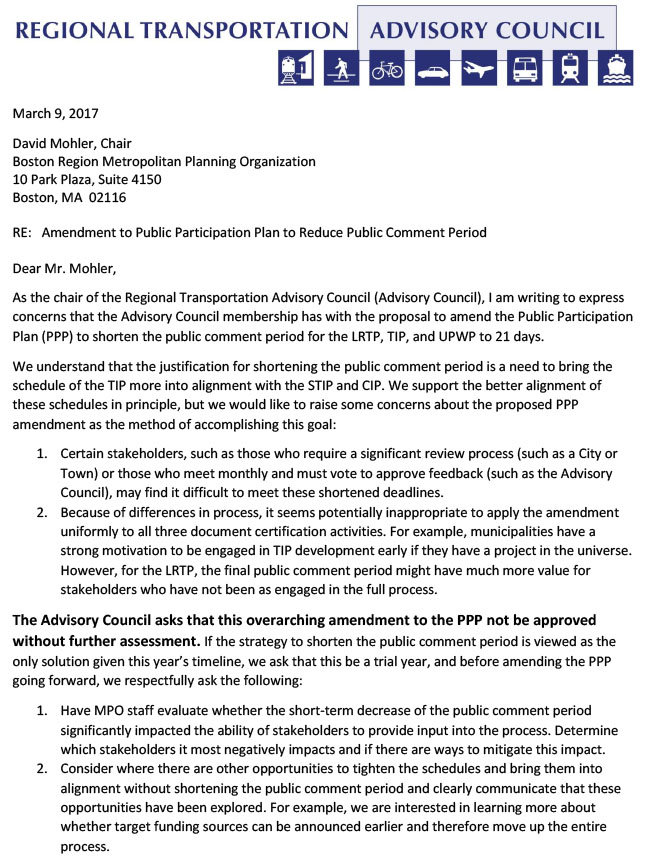
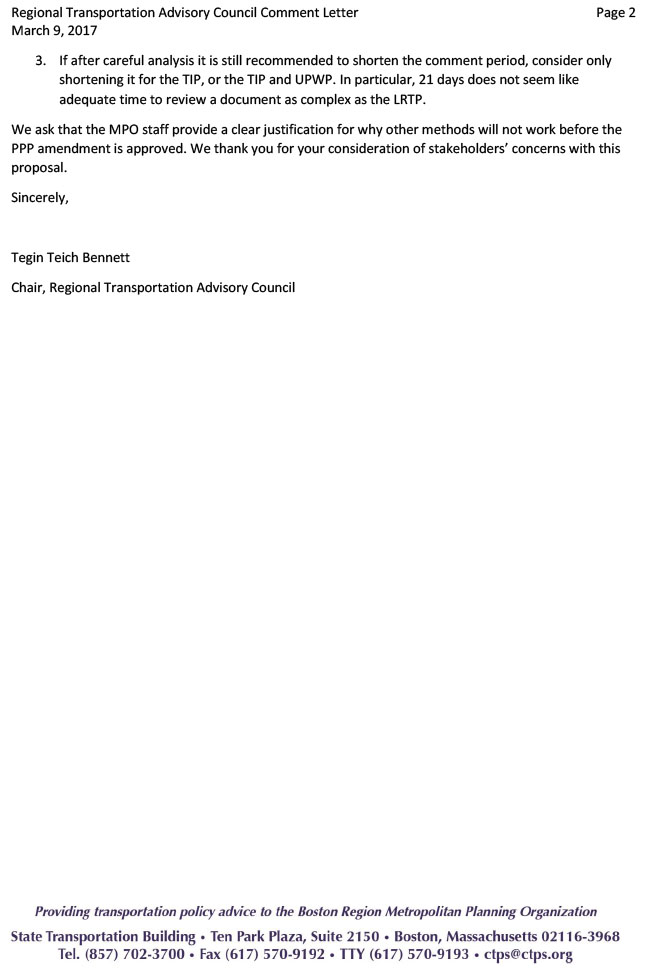
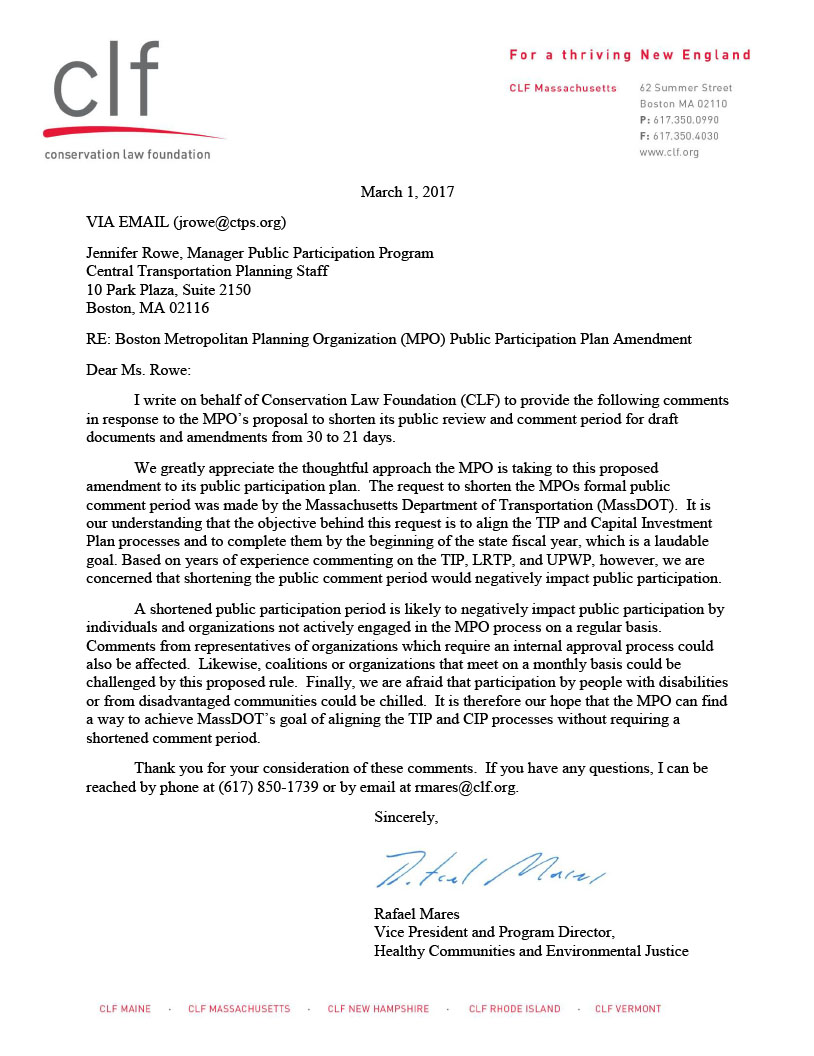
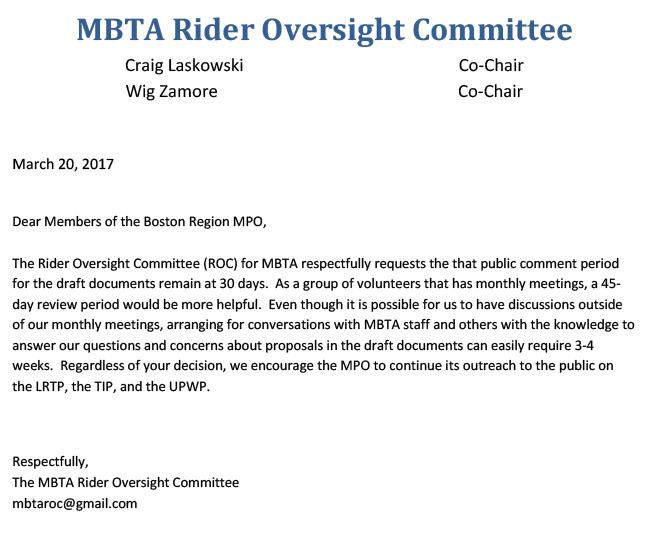
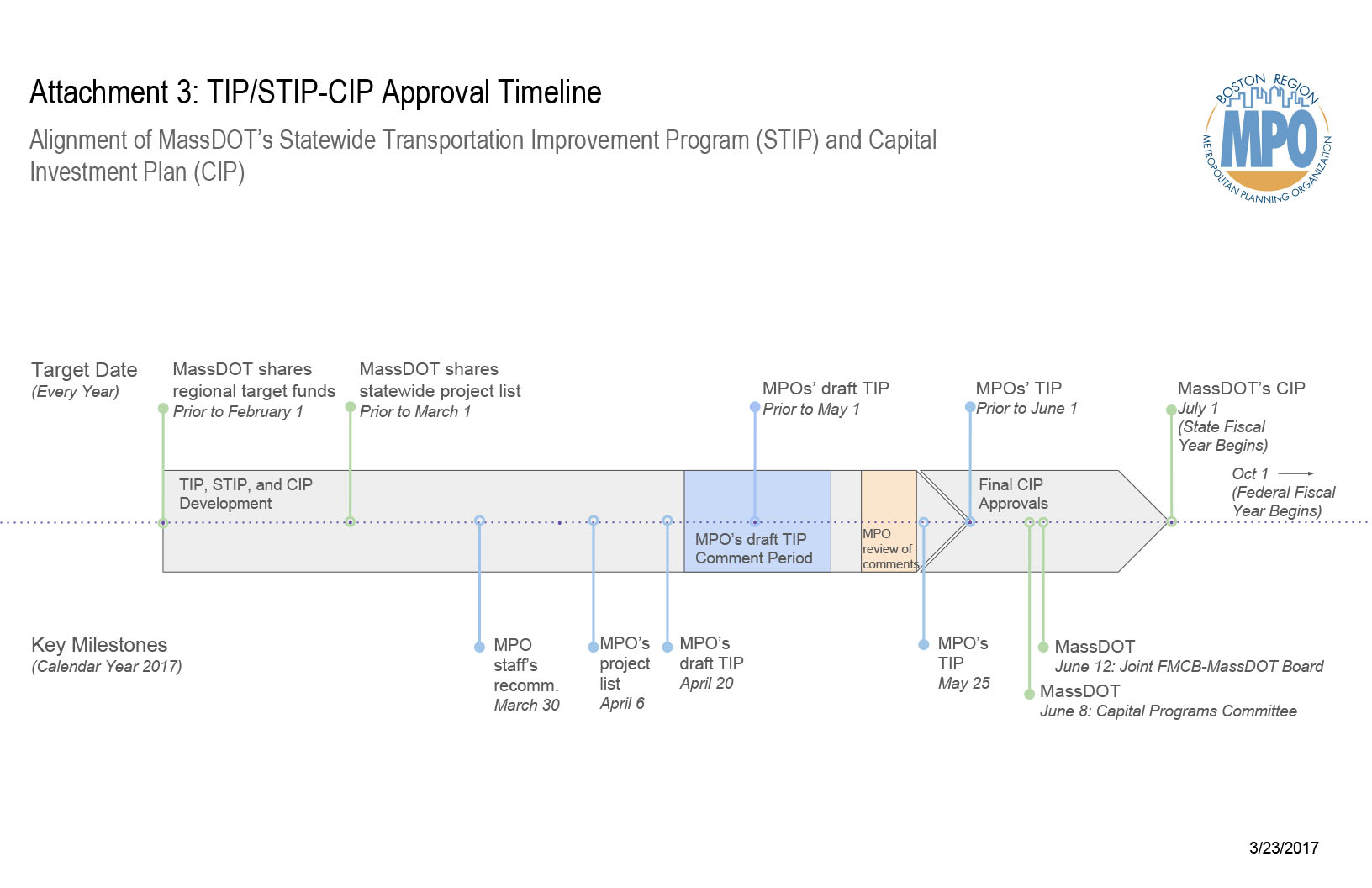
§450.316 interested parties, participation, and consultation.
i. Providing adequate public notice of public participation activities and time for public review and comment at key decision points, including a reasonable opportunity to comment on the proposed metropolitan transportation plan and the TIP;
[...]
vii. Seeking out and considering the needs of those traditionally underserved by existing transportation systems, such as low-income and minority households, who may face challenges accessing employment and other services;
viii. Providing an additional opportunity for public comment, if the final metropolitan transportation plan or TIP differs significantly from the version that was made available for public comment by the MPO and raises new material issues that interested parties could not reasonably have foreseen from the public involvement efforts;
ix. Coordinating with the statewide transportation planning public involvement and consultation processes under subpart B of this part; and
x. Periodically reviewing the effectiveness of the procedures and strategies contained in the participation plan to ensure a full and open participation process.
[Public Participation Plan, Chapter 3—The MPO’s Approach to Public Participation, Section 3]
[Page 26] The MPO’s vision for public participation in the region is to hear, value, and consider—throughout its planning and programming work—the views of and feedback from the full spectrum of the public, and use this input in its decision-making.
[Page 27: relevant excerpts] The MPO makes every effort to: